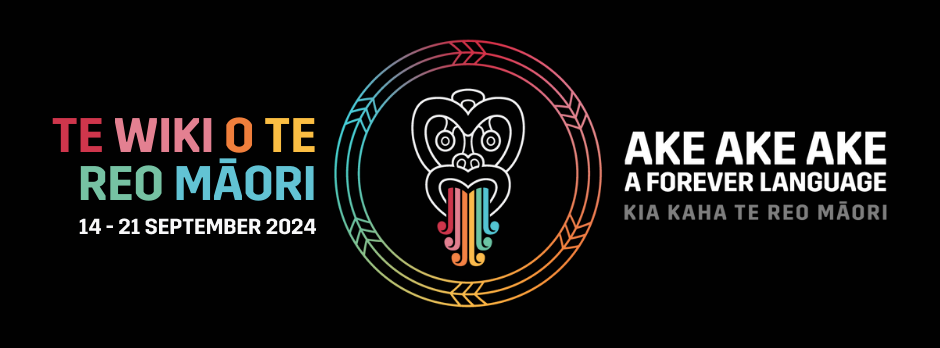Celebrating Māori Language Week – Te Wiki o te Reo Māori
The Importance of te Reo Māori to Aotearoa New Zealand

Every year since 1975, Aotearoa New Zealand has celebrated Te Wiki o te Reo Māori, also known as Māori Language Week.
This important week, starting around 14 September each year, brings the Māori language (te reo Māori) into the spotlight and gives all New Zealanders the opportunity to explore their relationship with the language, customs, and culture of the Māori people. The theme of this year’s celebration is 'Kia Kaha te Reo Māori' – which means ‘Make the Māori language stronger.'
Te Wiki o te Reo Māori is a government-sponsored initiative, forming part of the broader effort to rejuvenate and normalise the Māori language across all aspects of society. Over the course of the week, there are events, activities, and discussions across the country that honour and celebrate Aotearoa's unique heritage. This week-long observance encourages all New Zealanders to engage with te reo Māori and use it in their everyday lives, whether at home, at work, or in the community.
Why is Te Wiki o te Reo Māori Important?
The Māori language is a core part of New Zealand’s identity. The history of te reo Māori is one of resilience and revitalisation. Once the primary language of the land, it faced decline due to colonial pressures and the dominance of the English language. However, through dedicated efforts by iwi (tribes), whānau (families), educators, and the government, the language has been making a powerful resurgence.
The week provides an opportunity for everyone in New Zealand to take part in this resurgence. It is a chance to learn new words, perfect your pronunciation, and discover the cultural richness of te reo. From haka (Māori dance) performances to waiata (songs), storytelling, and language lessons, Te Wiki o te Reo Māori is a celebration that invites all people to embrace the language, no matter their proficiency level.
The Power of Words in Te Reo Māori
Words in te reo Māori carry much more than just their literal meanings; they are deeply connected to identity, spirituality, and history. For instance, the everyday greeting 'Kia Ora’ goes beyond pleasantries. It is a powerful recognition of a person’s mana (prestige or spiritual power), their whakapapa (genealogy), and their wairua (spirit). It is a reminder of the interconnectedness of all people and acknowledges a person’s essence and life force.
The Progress So Far
Over the years, the revitalisation of te reo Māori has made remarkable strides. Today, you’ll find dedicated Māori-language schools (kura kaupapa Māori), Māori radio stations, and Māori television channels broadcasting throughout Aotearoa. More businesses are using te reo Māori in their branding, and an increasing number of workplaces incorporate te reo into daily operations. Even in everyday conversation, we’re hearing more te reo Māori in public spaces.
But there is still work to be done. The rejuvenation of te reo Māori is an ongoing process, and it relies on the commitment of people from all backgrounds. The more of us who make an effort to use te reo Māori in our daily lives, the more it will become a natural and visible part of New Zealand society.
How Can You Get Involved?
Take a moment to reflect on how you can become more comfortable with te reo Māori. Whether it's through simple greetings, learning new phrases, or exploring Māori customs and traditions, your involvement matters. Every step we take towards normalising the use of te reo Māori is a step towards a more inclusive and culturally rich society.
If you’re interested in learning more about te reo Māori, or if you’d like to take lessons, there are plenty of online resources available. Visit the Reo Māori website at
www.reomaori.co.nz/courses to find courses that suit your learning level.
Most local councils around Aotearoa will also have a list of events and activities happening near you during the week, including language workshops, cultural performances, and other interactive sessions. A quick online search should show what’s happening near you!
Useful Māori Words and Phrases:
Here are some common te reo Māori words and their English translations to help you get started:
- E noho rā Goodbye (from a person leaving)
- Haere rā Goodbye (from a person staying)
- Haere mai Welcome! Come!
- Hei konā rā Goodbye (less formal)
- Kia ora Hi! G’day! (general informal greeting)
- Mōrena (Good) morning!
- Nau mai Welcome! Come!
- Tēnā koe formal greeting to one person
- Tēnā kōrua formal greeting to two people
- Tēnā koutou formal greeting to many people
- Tēnā tātou katoa formal inclusive greeting to everybody present, including oneself.
- Aroha compassion, tenderness, sustaining love
- Ihi power, authority, essential force
- Mana authority, power; secondary meaning: reputation, influence
- Manaakitanga respect for hosts or kindness to guests, to entertain, to look after
- Mauri hidden essential life force or a symbol of this
- Noa safe from tapu (see below), non-sacred, not tabooed
- Raupatu confiscate, take by force
- Rohe boundary, a territory (either geographical or spiritual) of an iwi or hapū
- Taihoa to delay, to wait, to hold off to allow maturation of plans, etc.
- Tapu sacred, not to be touched, to be avoided because sacred, taboo
- Tiaki to care for, look after, guard (kaitiaki: guardian, trustee)
- Taonga treasured possession or cultural item, anything precious
- Tino rangatiratanga the highest possible independent chiefly authority, paramount authority, sometimes used for sovereignty
- Tūrangawaewae a place to stand, a place to belong to, a seat or location of identity
- Wehi to be held in awe
- Whakapapa genealogy, to recite genealogy, to establish kin connections
- Whenua land, homeland, country (also afterbirth, placenta)
- Hui meeting, conference, gathering
- Marae the area for formal discourse in front of a meeting house; or the whole marae complex, including meeting house, dining hall, forecourt, etc.
- Haere mai! Welcome! Enter!
- Nau mai! Welcome!
- Tangihanga funeral ceremony in which a body is mourned on a marae
- Tangi short (verbal version) for the above; or to cry, to mourn
- Karanga the ceremony of calling to the guests to welcome them onto the marae
- Manuhiri guests, visitors
- Tangata whenua original people belonging to a place, local people, hosts
- Whaikōrero the art and practice of speech making
- Kaikōrero or kaiwhai kōrero speaker (there are many other terms)
- Haka chant with dance for the purpose of challenge (see other references to haka on this site)
- Waiata song or chant which follows a speech
- Koha gift, present (usually money, can be food or precious items, given by guest to hosts)
- Whare nui meeting house; sometimes run together as one word – wharenui
- Whare whakairo carved meeting house
- Whare kai dining hall
- Whare paku lavatory, toilet
- Whare horoi ablution block, bathroom
- Rāhina; Mane – Monday
- Rātū; Tūrei – Tuesday
- Rāapa; Wenerei – Wednesday
- Rāpare; Taite – Thursday
- Rāmere; Paraire – Friday
- Rāhoroi – Saturday
- Rātapu – Sunday
- Kohitātea – January
- Hui-tanguru – February (also Pepuere)
- Poutū-te-rangi – March
- Paenga-Whāwhā – April
- Haratua – May
- Pipiri – June
- Hōngongoi – July
- Hereturi-kōkā – August
- Mahuru – September
- Whiringa-ā-nuku – October
- Whiringa-ā-rangi – November
- Hakihea – December
- Raumati – summer
- Ngahuru – autumn
- Takurua – winter
- Kōanga – spring
Te Wiki o te Reo Māori is a time for celebration, reflection, and action. Whether you’re fluent or just beginning your journey with the language, this week is for everyone. The Māori language is for all New Zealanders, and the more we use it, the more it will thrive. Let’s all do our part in making te reo Māori a natural part of our everyday lives – Kia kaha te reo Māori!



